- Home
- Michael Duffy
Call Me Cruel Page 2
Call Me Cruel Read online
Page 2
Carol says the decision to leave her children was a traumatic one, which she now deeply regrets; today she finds it hard to understand what she was going through at that time. One thing she does know is that DoCS’ concerns were justified: years later, Kylie told her that McCann had already assaulted her twice by this time, once holding her out an upstairs window by her ankles and threatening to drop her, and once throwing her down a flight of stairs. At the time these attacks happened, Kylie was just four or five years old.
Losing her mother in this way, and later realising more fully how Carol had chosen her lover over her children, must have been deeply traumatic for Kylie, in ways most of us can only imagine. Leanne believes Kylie was probably more affected by it than she and Michael were, but has no idea to what extent. She doesn’t know if anyone ever sat down with Kylie at the time and explained what was happening and why their mother had left. But the effects were deep and permanent: Kylie was a victim of life long before she became a victim of Paul Wilkinson.
Louisa brought the children up for the next decade. She performed the job almost single-handedly, because Harry died the following year. John had access to his children every second weekend. When Kylie started in kindergarten at Villawood East Primary School, she became hysterical every day when Leanne—who was an older pupil at the school—left her at 9.00 a.m. This went on for weeks, until the teachers prevented Leanne from waiting with her outside the classroom. After that, Kylie seems to have calmed down and enjoyed primary school. She grew closer to her grandmother, who provided an emotional and physical refuge from which the child was able to observe her mother’s tortured second marriage.
A question raised years later by people familiar with Kylie’s disappearance is why she would have entered an abusive relationship with a man like Paul Wilkinson. One possible reason is that as she grew up, her main experience of a relationship between a man and a woman was her mother’s with Robert McCann. It lasted ten years, and Kylie visited her mother often, encountering McCann and seeing what he was doing to her. Maybe this conditioned the expectations she came to have of adult relationships. McCann was, after all, the man her mother loved—indeed, he was the man for whom she had abandoned Kylie and her other children.
McCann’s father had been in the air force, so the family moved around a lot in his youth. When he was fifteen his parents separated, and the next year he was convicted of multiple crimes—mainly stealing cars—and sent to Mount Penang Juvenile Detention Centre. He was a violent youth: one of his thefts had involved force, and in the year he met Carol he was charged with attacking another woman.
Carol and McCann married in March 1987. They both had jobs, she with the NRMA and he as a station assistant with the railways. She found him completely dominating. If a night went badly on the poker machines, he’d lock her out of the house. He took most of the money she earned and used it for drinking and gambling, and he insisted on seeing her financial records to make sure she was handing over everything. The couple spent their nights and weekends at clubs, drinking and playing the machines, except for the times he would head off into the darkness to do a bit of ‘midnight shopping’. He would steal cars and buy wrecks of the same models, swapping the plates and chassis numbers before selling them on.
In 1988 McCann stopped working for the railways and Carol and he were evicted from their house in Villawood. He started committing more crime, culminating in an ambitious attempt to rob the cash box on a train. In January 1989, he and a partner, who was dressed in a guard’s uniform, turned up on Platform 24 at Central Railway Station. Somehow the partner was able to take the place of a rostered guard on the service that collected the takings from railway stations, and he smuggled McCann on board.
Train 60A travelled to Bondi and down through the Shire to Waterfall, then back towards the city. Staff at each station put bags of cash in the locked steel box, and between stations McCann used tools he had brought with him to try to unbolt it from the floor. The getaway car was parked at Tempe, but when the train arrived there the box was still attached, so they went on, eventually throwing it off near Erskineville Station and jumping after it. The partner kept watch on the box, which was later found to contain $53,247.41, while McCann raced off to collect the car.
But they were caught, and in July McCann pleaded guilty to this and other offences; he was sentenced to seven years’ jail, with a non-parole period of three years. It would have been longer except that McCann had given information to the police.
The next three years provided Carol with a respite, but when McCann got out of jail she took him back and the cycle of violence recommenced. Kylie—who hated the man and couldn’t understand why her mother stayed with him—was now eleven.
Fortunately for the children, Louisa continued to provide an emotional centre for their lives. She later described Kylie as a private child who didn’t like being told what to do and was snappy at times. She was a bit of a wanderer and could be unsettled, and liked doing things on her own. Outwardly she was an average sort of girl, not doing too well academically but enjoying sport, for a while playing with the Birrong Sports Netball Club. She was a happy-go-lucky kid in a casual world, wearing brightly coloured T-shirts tucked into loose shorts, usually with thongs. Her light-brown hair was cut just above her shoulders.
A change occurred at the end of primary school. Kylie wanted to go on to Bass Hill High School, like all her friends, but Louisa insisted she go to Chester Hill High School because that’s where Leanne and Michael were. (Leanne had started out at Bass Hill but switched because it was too rough.) At Chester Hill, Kylie became a rebel. When Leanne was sixteen she moved into a spare room in Louisa’s garage and her friends would come over, some of them boys with cars. Over the next few years, Kylie was always trying to go out with the older kids. She showed off and sought their attention, but she didn’t seem to have too many friends of her own.
Carol says that Kylie went off the rails in high school. She started skipping classes and Louisa was unable to control her. Often she would stay out until midnight. When she was thirteen or fourteen, she began to sleep over at the house of a boyfriend, Troy Myers, at Regents Park. For several years she lived there or at Louisa’s, depending on the state of her relationship with Troy. His mother, Maxine Cahill, became a good friend, and Kylie called her ‘Mum’.
Cahill doesn’t remember a lot about Kylie at that age. She does recall that she knew how to have fun. They would all go driving together with music blaring out, and Kylie could be cheeky. She might call out to a man walking his dog, ‘It’s not nice to take your wife for a walk!’ She was popular with boys but didn’t have a lot of boyfriends. Later in her adolescence, she was interested in a policeman from Bass Hill but it didn’t go anywhere. She didn’t drink a lot or smoke, and had stopped playing much sport, although for a while she was a cheergirl for a rugby league team.
Kylie, says Cahill, ‘loved to laugh and was very trusting. She trusted too much, believed everything people would say.’ It was an observation others would make in the years to come.
It was an uncertain adolescence and sometimes a violent one. One day in 1996, Kylie was umpiring a game of hockey at the Sefton Roller Rink when she was attacked by a boy who’d recently broken up with her best friend. The boy was under the impression Kylie had been spreading gossip about their break-up, and he struck her with his hockey stick. She fell to the ground but managed to get up and off the rink, where she sat down and took her skates off. She began to have trouble breathing so she walked over to the first-aid post and collapsed, unconscious. An ambulance took her to Auburn Hospital. The assault left her with sore ribs, blurred vision in her left eye and a numbness on the left side of her face. This developed into Bell’s palsy, which caused that side of her face to droop for about a week.
Meanwhile, Carol’s marriage with McCann continued and the violence got worse. He’d hold a knife to her throat and say, ‘Ring your mother an
d say goodbye to her.’ Carol says she was too scared to leave because McCann said that if she did, he would hurt her children. The injuries she suffered were extensive and serious, yet he got away with hurting her for a long time.
Years later, after her marriage broke up, Carol would give evidence against McCann in court after he was charged with assaulting her. A few details from the hearing give a sense of what she’d gone through. The transcript shows that, at first, the magistrate at Sutherland Local Court had difficulty grasping just how many assaults there were and how far back they stretched.
BENCH: Well, wait a minute, what are we talking about now? . . . I’ll have to start again . . . 30 July 1988 [assault on Carol], that’s the first assault occasioning [actual bodily harm]. The second assault occasioning matter that I have is between 1 January 1988 and 31 December 1988 at Fairfield, assault . . .
CRAWFORD-FISH [McCann’s lawyer]: Yes, your worship, that’s correct.
BENCH: The next matter I have is between 1 March 1991 and 31 March 1992 assault, common assault on Carol Anne McCann?
CRAWFORD-FISH: That’s correct.
BENCH: The next matter I have is 26 November 1996 at Narellan, assault occasioning actual bodily harm on a person?
CRAWFORD-FISH: That’s correct.
BENCH: And then malicious wounding between 15 October 1997 and 16 October at Chester Hill?
CRAWFORD-FISH: That’s correct, your worship.
Behind this incomplete list lay the long and violent history of Carol’s second marriage, part of the background to Kylie’s childhood and adolescence. In his sentencing, the magistrate said McCann’s offences ‘fall into the most serious category as far as the assault occasioning [bodily harm] matters are concerned in terms of the extreme violence that was used . . . They not only involve acts of violence but they involve acts of violence which resulted in substantial injuries on some occasions and the implements used to inflict those injuries include . . . tennis rackets, cricket bats and there was even a threat with a knife.’ He sentenced McCann, who had pleaded guilty at the last minute, to nine months’ periodic detention.
Despite the assaults listed above, and all the others, Carol continued to live with McCann through the second half of the 1990s. After every attack she told herself, ‘I’ve got over this hurdle,’ and hoped things would get better. This is quite common with domestic violence, where victims often return to their abusers a number of times before leaving for good. Things didn’t get better for Carol, whom McCann continued to hit and abuse and belittle and isolate.
She decided to withhold a small amount of her wages from him and put it in a bank account. One night he went through her bag and found the bank book. This started a massive argument, and he bashed her and grabbed a knife and stabbed her. Then he threw her out of the house and onto a marble walkway and slammed the door. There was blood everywhere and Carol had several broken ribs. Somehow she managed to get up and started to walk towards her mother’s place, but before long she collapsed on the footpath. There she was found at 2.00 a.m. by Kylie, who had been out and was walking home. She helped Carol to Louisa’s and called a doctor. He wanted her to have McCann charged with assault but she refused. Carol says Kylie went back to her place with an iron bar but McCann refused to open the door. Kylie sought psychiatric help after this incident: she wanted to kill both her stepfather and herself.
Carol was taken up to her sister Joy’s place at Green Point north of Sydney, a region known as the Central Coast or, to locals, simply as the Coast. But once she’d recovered, she went back to McCann. He still had total control over her and kept her as isolated as possible from other people, always wanting to know where she was, checking the grocery dockets to see how much she’d spent. The violence became even more frequent. Finally, on 30 July 1998, it came to a head. They were at the club in the evening and he asked her for more money to put through the machines. She told him he couldn’t have any and left the club by herself. He followed her out in a fury and attacked her on the street, bashing and kicking.
Kylie actually witnessed some of this assault. She was driving past in a friend’s car and saw McCann hit Carol in the face. ‘That was my mother,’ Kylie said to the driver.
‘Are you sure?’
‘I think I know my own mother! Turn around and go to the police station!’
When they arrived, Kylie ran inside and said, ‘My mum is being bashed on the corner.’ Two police raced to the scene and spoke with the couple. When Kylie later saw Carol, she had a lot of blood on her face and clothes, and cuts to her nose and lip, a swollen right eye and cheek, and grazes and abrasions on her left elbow and her hands.
Carol was taken to Bankstown Hospital, where she spent three weeks and had part of her face rebuilt. She describes this as a turning point in her life. An apprehended violence order was taken out on McCann, and after Carol was released from hospital she spent three months in a refuge, away from Sydney so he couldn’t find her. She decided to move to the Coast, where her mother now lived at Erina. The night of the attack was the last time she saw McCann, apart from when she went to court to give evidence against him a few years later.
Kylie had one more encounter with her stepfather. Her relationship with Troy Myers had ended, and when she was eighteen she began going out with Dean Lucan, a young bartender at the Regents Park Bowling Club. He was a quiet man, a champion at lawn bowls, and Kylie started to play too. They lived together in a flat in Auburn and things seemed to be going well. The family say Dean was a calm young man and had a calming effect on Kylie while they were together.
One Friday night in 1999, they were in the club with two other people after closing time, having a drink while Dean counted the night’s takings. Suddenly a masked man wielding a pistol came in and pointed the gun at Kylie’s head. He yelled at Dean, ‘If you know what’s good for you, you’ll pack the money in the bag, or she’s going to get it!’
Dean gave the man the money and he left. Kylie was sure it was Robert McCann. She told the police of her suspicions, but there was insufficient evidence and he was never charged with the robbery. Carol says that after this Kylie became depressed, had counselling and left Dean. She went to live for a while with Louisa.
Robert McCann continued to attack women and, like many abusers, to deny responsibility for his actions. In 2002 he was convicted of bashing and raping his flatmate, an Asian student. He proclaimed his innocence, and at his sentencing, when his record of violence during his marriage came up, he said, ‘I never deliberately set out to hurt or harm my wife.’ He accused Carol of behaving in a manner ‘that triggered off my behaviour’. He was sentenced to a jail term of at least four years and nine months.
*
After leaving Dean, Kylie started a relationship with a man named Ben in Victoria. Carol thinks she might have met him on the internet. Ben came up to meet the family, and it turned out he was from a big, religious family. Without warning, Kylie packed her bags and moved to Melbourne, where by December 2000 she’d got a flat by herself at Moonee Ponds and a job at Coles. She also did some work as a nurse’s assistant: she’d always been interested in helping people professionally and had done some volunteer work as an ambulance officer.
Ben lived with his family not far from Kylie’s new home. Leanne thinks he was a Catholic and that Kylie might have become a Catholic for a while. Carol thought they were lovely people, but she didn’t think that Ben, who was interested in computers, was Kylie’s sort. One night Kylie went to a restaurant with Ben’s family and met Sean Labouchardiere. He was thirty years old, ten years older than her, a handsome man with blond hair, and had been in the navy for six years. Based in Sydney, he’d come to Melbourne to sit an examination for the police force, thinking he might like a change.
They got talking and Sean gave Kylie a lift home from the restaurant, and the next day after he did the police exam he found her waiting for him. That night t
hey watched some videos at her place. Sean returned to Sydney and Kylie started sending him five to ten text messages a day. She said her relationship was in trouble and asked Sean if he’d go out with her if she broke up with Ben. Sean would later learn that this was one of Kylie’s characteristics: she was great one for change but liked to plan her changes in advance. He agreed with her suggestion.
He transferred to Melbourne and they began to see each other. She was loud, sometimes stroppy, while he was quiet. He liked the fact she was an easy-going woman with no airs and graces. She dressed in jeans or tracksuit pants, T-shirt or casual jacket, and enjoyed the classic Aussie bands from when she was growing up, Cold Chisel and INXS. She was a very organised person: she kept a diary and was always thinking about what she was going to do. He visited her at work at a nursing home and saw how well she got on with the patients.
Their relationship was hugely important to Kylie because there were few people in her life. At first she had little to say about her family, and Sean gained the impression she was running away from some problem. She would ring her grandmother Louisa every week, but apart from that there was almost no contact. She had no friends in Melbourne and the couple spent most of their free time with Sean’s family.
After a while, Kylie told him some of her background, how she’d been brought up by Louisa and Maxine Cahill, the hold-up and the counselling she’d had afterwards, and a policeman she’d gone out with for a short time until something happened at work; one night he had pulled out his gun and threatened her. Another boyfriend, she said, had been violent towards her. She appeared to have got over these experiences and was generally bright and bubbly, which Sean liked. At times, though, there was something a little forced in her cheerfulness, and occasionally she’d become angry for no apparent reason. But these were only minor things.

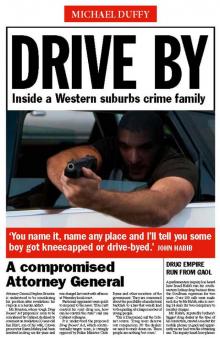 Drive By
Drive By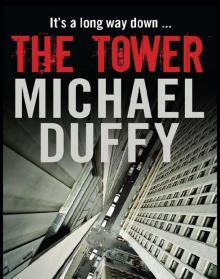 The Tower
The Tower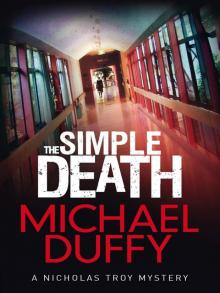 The Simple Death
The Simple Death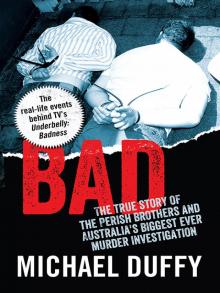 Bad
Bad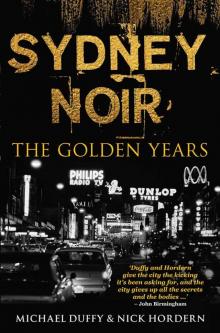 Sydney Noir
Sydney Noir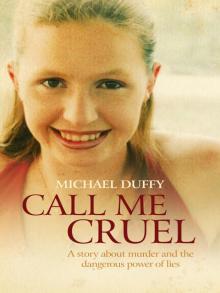 Call Me Cruel
Call Me Cruel